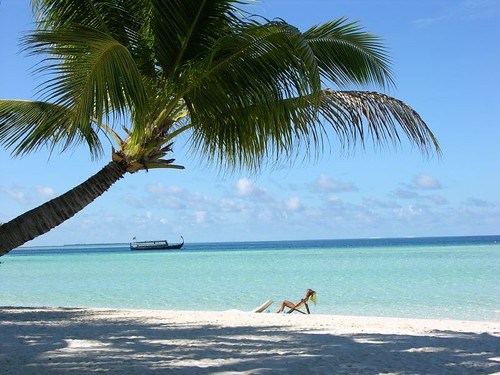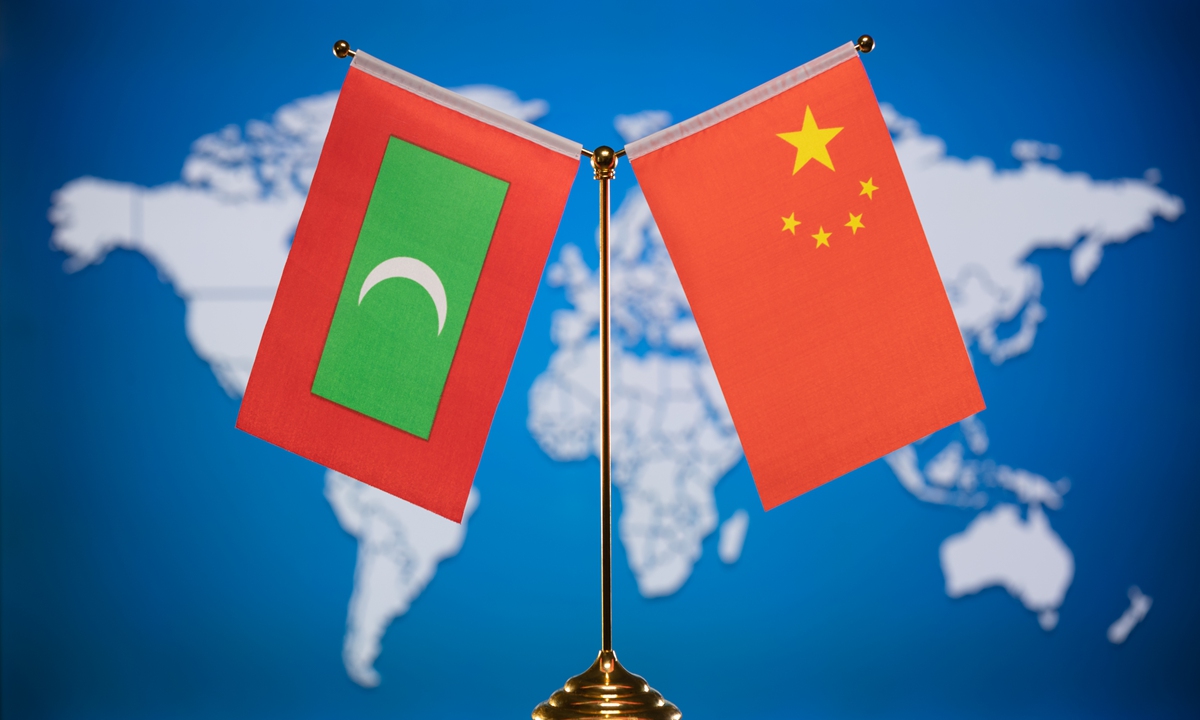China-Maldives relations expected to reach new heights
Maldives #Maldives


China-Maldives relations. Photo: VCG
The bilateral relations between China and the Maldives are expected to reach new heights as Maldivian President Mohamed Muizzu began his first state visit to China on Monday since taking office. Analysts noted that a number of agreements on infrastructure and tourism are expected to be signed during the Maldivian leader’s visit.
However, President Muizzu’s decision to visit China before India has raised concerns among some Indian media outlets, with many speculating that the Maldivian leader is pursuing an “India-out” policy and leaning toward China.
Chinese analysts said that interpreting Muizzu’s China visit as a pro-China policy reflects the lack of confidence among certain Indian politicians. They believe that India’s long-standing hegemonic mentality in South Asia is the root cause of strained relations with some regional countries, including Maldives and that India should not shift the blame onto China by hyping the narrative of competition with China in the region as an excuse.
At the invitation of Chinese President Xi Jinping, President Muizzu is scheduled to pay a state visit to China from January 8 to 12. On Monday, President Muizzu and the First Lady Sajidha Mohamed arrived in Xiamen, East China’s Fujian Province, and were greeted by senior Chinese officials upon their arrival. They also visited the Xiamen Free Trade Zone, according to the Maldivian President’s Office.
During President Muizzu’s stay in China, President Xi will hold a welcome ceremony and banquet for President Muizzu. The two heads of state will hold talks and attend the signing ceremony of cooperation documents. Chinese Premier Li Qiang and Zhao Leji, chairman of the National People’s Congress Standing Committee, will also meet with President Muizzu, according to the Chinese Foreign Ministry.
President Muizzu is the first foreign head of state to visit China by invitation in 2024 and this is also the Maldivian president’s first state visit to a foreign country since he took office last November, highlighting the great significance that the two countries attach to bilateral relations, analysts said.
During Muizzu’s stay in China, the two sides are expected to sign a slew of cooperation documents on infrastructure construction under the Belt and Road Initiative (BRI), economy, climate change, green economy and tourism, analysts said.
China and Maldives are also highly expected to further dig up the potential of bilateral free trade agreement (FTA) as President Muizzu is choosing Fujian Province as his first stop in China, Qian Feng, director of the research department at the National Strategy Institute at Tsinghua University, told the Global Times.
As a famous tourist and coastal city in China, Xiamen’s development experience may shed light on cities of the Maldives as it has also quickly become one of the most famous tourist destination countries in the world. President Muizzu may want to draw some experience from Xiamen’s development in attracting tourists as China is also a large tourist source of the Maldives, said Qian.
Moreover, Fuzhou, the capital of Fujian Province, is a significant gateway to the maritime silk road. According to the Maldivian President’s Office, President Muizzu will also attend the Invest Maldives Forum in Fuzhou, China, and meet with senior Chinese business leaders to explore avenues for strengthening socioeconomic relations between the Maldives and China.
The cooperation on infrastructure construction would also be a highlight in bilateral cooperation. Long Xingchun, a professor at the School of International Relations at Sichuan International Studies University, noted that infrastructure is of great significance to the Maldives, an island nation heavily reliant on tourism, and China holds a leading position in this field.
The previous collaboration with China has greatly contributed to the development of Maldives’ infrastructure. For instance, the expansion of upgrading of Velana International Airport in the capital city of Male and the China-Maldives Friendship Bridge, the first cross-sea bridge in the Maldives built by a Chinese company, are notable achievements resulting from this partnership, Long told the Global Times.
President Muizzu, who had taken the position as the former minister of Housing and Infrastructure and former mayor of the capital city Male, has witnessed the achievements of BRI projects in the Maldives and had also praised the initiative, analysts said.
For example, in an interview with the Xinhua News Agency in October 2023, Muizzu, who was then president-elect, said, “I think the Belt and Road initiative can play a crucial role in our development and also the development of all the countries in this initiative. And definitely I see this initiative play a very crucial role in taking us forward.”
President Muizzu is actively promoting pragmatic cooperation as he has fully acknowledged the importance of cooperation with China and his diplomacy is out of Maldives’ true interests not to choose sides, analysts said.
Long also noted that China respects the Maldives’ sovereignty and does not interfere in its domestic affairs. Unlike India, China does not exclude other countries’ cooperation with the Maldives. On the contrary, China encourages and welcomes more countries, including India, to engage in collaboration with the Maldives.
India’s lack of confidence India has paid close attention to President Muizzu’s visit and some Indian media have hyped that President Muizzu’s visit to China broke the “tradition” of every Maldivian president choosing India as their first destination after assuming office since 2008. They also said the visit happened against the backdrop of strained ties between India and the Maldives while China is “vying” for influence with Indian in the region.
Indian media claimed that relations between the Maldives and India have become tense since Muizzu assumed power in November 2023, with some alleging that Muizzu is pursuing an “India Out” policy to distance the Maldives from India’s support.
Adding to the strain, a recent controversy has emerged wherein certain Maldivian ministers reportedly made derogatory remarks on social media in response to Indian Prime Minister Modi’s promotion of Lakshadweep archipelago for tourism. President Muizzu suspended the three deputy ministers, according to media reports.
India’s strained relations with certain countries in South Asia can be attributed to its perception of being the regional boss. Instead of shifting blame to China, India should take a moment to reflect on its policies toward its neighbors and abandon the zero-sum mentality, analysts said.
As the president of the Maldives, Muizzu has his own considerations when it comes to the state visit to a foreign country. Muizzu’s foreign diplomacy is shifting from “India first” not to “China first” but to “Maldives first,” Lin Minwang, deputy director at the Center for South Asian Studies at Fudan University, told the Global Times on Monday.
Muizzu is not choosing sides between China and India, and China does not require him to do so. Instead, he is putting the interests of his own country first, said the expert.
The Indian media has attempted to exert pressure on Muizzu by hyping the so-called “pro-China” policy. This highlights India’s view of itself as a hegemony in the region, expecting leaders of other countries to seek its approval, Lin said.
Long noted that Indian media’s labelling President Muizzu as “pro-China’ highlights that they show no respect to the Maldives and its leader; and it also shows that they lack confidence in India while facing China.
India is a significant country to the Maldives whether it is from the geographic or historical factor, and its current nervousness about President Muizzu’s visit to China unveils its lack of confidence, said Long, noting that as a major country in the region, India should be more magnanimous.